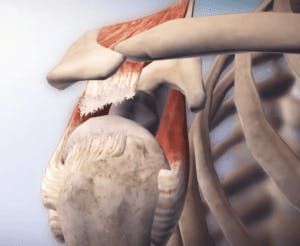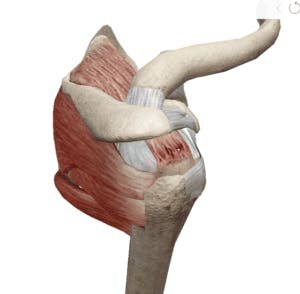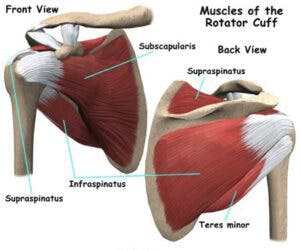Rotator cuff tears are common shoulder injuries. They can occur during sport activities, with any strenuous upper-extremity activity, or with falls or trauma. Tears can also be degenerative, occurring over time.
Partial vs Complete Tears
A partial tear is when one of the muscles that makes up your rotator cuff is worn or damaged.
A complete tear involves damage that runs all the way through the tendon and may even cause the tendon to come completely off your shoulder bone.


What is the rotator cuff exactly?

The rotator cuff consists of a group of four muscle-tendon units that work together to hold the ball of the upper arm (humerus) bone centered in the socket of the shoulder, while your muscles such as the deltoid and pectoralis major lever the arm bone to create movement.
For any shoulder motion that you perform, the muscles and tendons that make up the rotator cuff must coordinate and balance to create smooth movement and keep the head of the humerus center in the socket.
Common symptoms of a rotator cuff tear:
- Pain with activities, particularly overhead lifting
- Discomfort or pain lying on your arm
- Pain that moves from the shoulder down the arm to the deltoid muscle
- Weakness in the effective shoulder
How important is rehabilitation in the treatment of a rotator cuff tear?
Physical Therapy plays a critical role in both the nonsurgical and surgical treatment of a rotator cuff tear.
When a tear occurs, there is frequently atrophy (wasting) of the muscles around the arm and loss of motion of the shoulder. An effective physical therapy program is necessary to regain strength, restore range of motion, and improve function in the shoulder.
If surgery is not recommended, physical therapy plays a key role in developing strength, improving mechanics and increasing range of motion to help alleviate pain and reduce the risk of further damage.
After surgery, the repaired tissue must be protected from certain activities that may put healing at risk. A therapist can provide a safe and progressive therapy program. Even though surgery repairs the defect in the tendon, the muscles around the arm remain weak, and a proper, progressive rehabilitation is necessary for success.
If your shoulder pain causes you to miss out on normal day-to-day activities, we can help. Request an appointment online or call our office at 508-721-0000 to book an appointment with one of our Physical Therapists.

